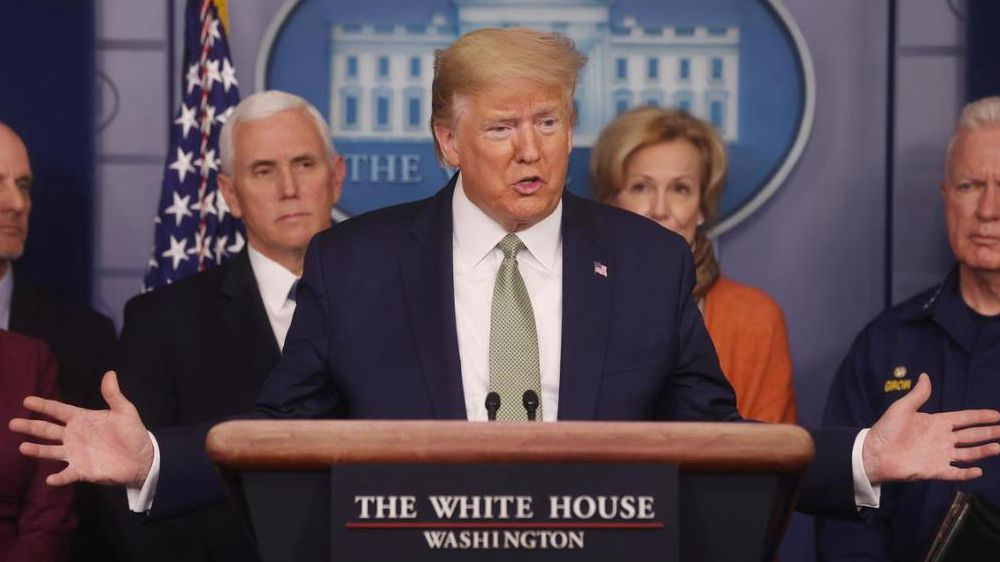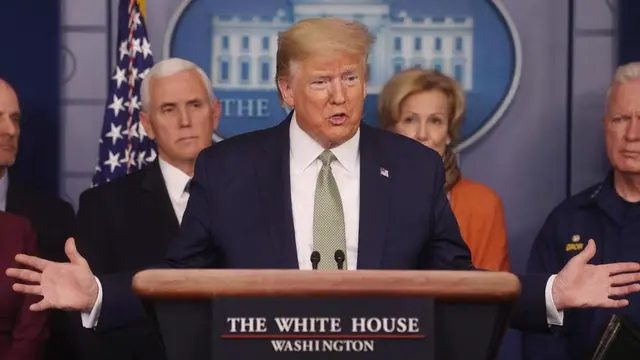
U.S. President Donald Trump addresses his administration's daily coronavirus briefing at the White House in Washington, March 17, 2020. /Reuters
**Editor's note: **Andrew Korybko is a Moscow-based American political analyst. The article reflects the author's opinions and not necessarily the views of CGTN.
The statements by President Donald Trump, other U.S. officials, and the administration's surrogates in the media that China is responsible for the global COVID-19 outbreak are part of what the U.S. considers to be the new Cold War.
The meteoric rise of China over the past several decades since the start of its economic reforms has played a greater role than anything in making the world more multipolar since 1991, which has contributed to gradually reforming the system of international relations in order to make it more equitable for all countries.
The U.S.' unipolar dominance began after the dissolution of the Union of Soviet Socialist Republics, but ultimately proved to be short-lived after the 2008 financial crisis exposed its fundamental economic vulnerabilities and started the process of accelerating the ongoing trend towards multi-polarity. Trump, however, is adamantly against any development that results in his country exercising comparatively less power over international relations, ergo his administration's intense dislike of China, which is the closest that the U.S. has to a systemic equal.
That hostile sentiment soon transformed into what has already been described by some as the U.S.' belief that it's in a new Cold War with China, which refers to America's intense efforts to reverse the world's multi-polar trends in order to indefinitely protect Washington's fading unipolar dominance. Trump's infamous trade war, the U.S.' provocative moves in the South China Sea, and its media's information warfare against China are some of the most notable aspects of the hybrid war that America is waging against China.
This state-of-the-art proxy conflict was elaborated upon by The New York Times this month in their article about how "Coronavirus Drives the U.S. and China Deeper Into Global Power Struggle," which focused on how this global pandemic has been politicized by the Trump administration in an attempt to discredit China's soft power across the world. This explanation of events is accurate since COVID-19 has been wielded as a weapon to bash China at every possible opportunity instead of cooperating with it to stop the virus.

A swab to be used for testing the novel coronavirus is seen in the supplies of Harborview Medical Center's home assessment team, Seattle, Washington, U.S., February 29, 2020. /Reuters
The coronavirus plays more than just an information warfare role, however, since the intended economic consequences of this latest narrative power play are closely connected even though they're doomed to fail. The U.S. is betting that it can weaken the world's trust in China as a first step to convincing other countries of the need to follow Trump's model of economic nationalism whereby he's sought to either re-offshore certain industries away from China or encourage them to outright return to the U.S.shores.
Blaming China for the virus and fear-mongering that it might even hold the medical supplies that foreign companies produce within its borders hostage for speculative political reasons are all about the economic endgame of trying to reverse globalization, which is a characteristic of the emerging multipolar world order whose failure would tremendously advance the U.S. grand strategic vision of reinforcing its fading unipolar control over international relations.
As the saying goes, "everyone is entitled to their own opinion, but not to their own facts," and as the facts objectively prove, China did its utmost to contain the virus once it became clear that a new disease was spreading throughout Wuhan. Moreover, not only has China never even remotely implied any intent to hold medical or other foreign-produced goods hostage, it's even donated such supplies to European countries like Italy and Serbia in a powerful show of solidarity with their people during these very tough times.
To channel yet another saying, "actions speak louder than words," and China's actions debunk the weaponized narrative that the U.S. has been trying to propagate lately. In addition, while the U.S. actions strongly suggest that it sincerely believes that it's waging a new Cold War against China, China's actions show that it's still open to friendship, cooperation, and brotherhood with all the people of the world, including Americans. Unlike the old Cold War, there's only one side competing in the new one, and that's the US, while China only wants peace.
(If you want to contribute and have specific expertise, please contact us at [email protected].)
 简体中文
简体中文

